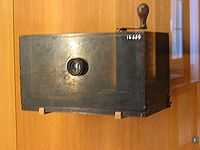Léon Bouly
Léon Guillaume Bouly (French: [buli]; 1872–1932) was a French inventor who created the word cinematograph.
Cinematograph
After devising chronophotography devices, Bouly applied a patent on a reversible device of photography and optics for the analysis and synthesis of motions, calling it the Cynématographe Léon Bouly on February 12, 1892. On December 27, 1893, he shortened his device name to cinématographe.

This device is able to perform both, shooting and projection. It uses a sensible film without perforations and all principles required by cinematography are available: the film's jerky sledding is synchronized with the shutter. Two of these devices are conserved in the French Conservatoire National des Arts et Métiers.
In 1894, Bouly could not pay the rent for his patents and the name "cinématographe" became available again, it was patented by the Lumière Brothers who are not its original authors. Today, modern historians agree on the fact Léon Bouly was, before the Lumière Brothers, the true original inventor of the term cinématographe.[citation needed]
References
- Michel Auer, Michèle Ory. Histoire de la caméra ciné amateur. Éditions Big; Geneva, 1979, pp. 44, 46–47. ISBN 2-85917-011-1